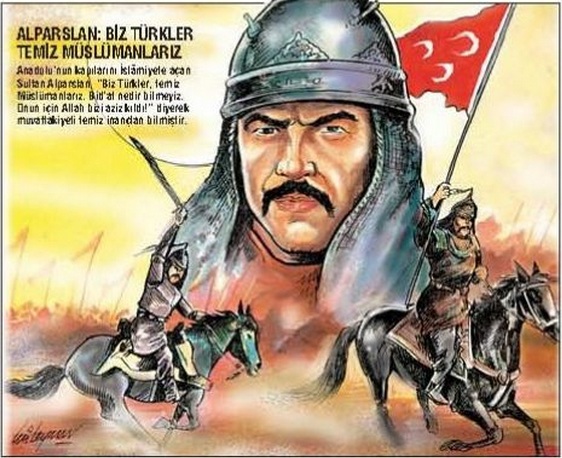
CONTRIBUTIONS OF THE TURKS TO ISLAM
Many historians confess that the Turks have made the most sincere contributions to Islam after the Companions (Sahaba) of the Prophet. The fact that Islam has survived through many misfortunes and still exists today is proof of this.
Turks have always been a warrior nation. They had strong resistance to long wars, campaigns, and natural conditions. After embracing Islam, they wholeheartedly adopted their new religion. They completely abandoned aspects of their old customs that did not align with it. They did not yearn for their past days. These qualities made them the standard-bearers of Islam. Islam spread to vast territories through the Turks. It reached deep into Europe, China, and Siberia. This is called the Turkish World Domination Ideal. The Turks referred to Rome, the center of Christianity, as "Red Apple" and determined it as the ultimate goal of their conquests.

THE RESULT OF GOOD MORALITY
The Karakhanids were the first among the Turks to embark on a jihad for the sake of Islam. They played a role in the Uyghurs (Uighurs) converting to Islam. The Ghaznavids also brought Afghans and Indians into Islam. After the conquest of Anatolia, Islam spread in Roman territories through the Turks. In addition to the native population, Pomaks, Albanians, Bosnians, Macedonians (Torbeshi), and Patriotes in the Balkans; Mongols, Georgians, Laz, Abaza, and Circassians in the Caucasus; as well as some groups from Anatolia's native populations such as Greeks, Armenians, and Yazidis, converted to Islam willingly through the Turks. Turkish sultans did not accept different treatment of the communities in their countries in terms of social, cultural and religious aspects, and they granted equal rights and justice to all. Many non-Muslims converted to Islam by witnessing the Turks' tolerance and good morality.
The Seljuks and Ottomans repeatedly halted the Crusades, thus saving the Islamic world from a tremendous disaster. A Turk, the Mamluk Sultan of Egypt Baybars, stopped the Mongol army, which had killed hundreds of thousands of Muslims and seemed unstoppable. The idea of spreading and announcing God's name (religion) everywhere, called "Ilaa al kalimatullah", reached its highest level in the Ottoman Empire, whose conquests were aimed at the Christian world. In the 16th century, three out of the four major independent Islamic states in the world were Turkish: the Ottoman, Gurkani, and Iranian states. The fourth was the Moroccan Sultanate, which lived under Ottoman rule for a time. Thanks to the Turks, Muslims lived in unity and solidarity for centuries. Turkish rule lasted until 1858 in India and 1925 in Iran.
For centuries, Turks struggled against the Shia belief, symbolizing Persian nationalism and threatening Islamic unity. Seljuk Sultan Tughril Beg entered Baghdad and saved the caliph from the captivity of the Shia Buyids. Salahuddin Ayyubi (Saladin), one of the Seljuk commanders, eliminated the Shia Fatimids in Egypt, who were conducting propaganda activities to disturb Islamic countries, greatly serving Islam. Sultan Selim I defeated the Safavid State, which had agents operating in Anatolia, minimizing the power of the Hurufis. The Ottomans also suppressed the Wahhabis, who emerged at the end of the 18th century. Without the Turks, it is doubtful that Islam would have reached today with its original purity. As evidenced, in the last century when Turkish rule collapsed, Islamic countries were either occupied by imperialist states or came under the rule of these heretical groups or socialist revolutionaries.
WERE THERE NO SCHOLARS AMONG THE TURKS?
The Turks held dominance in the Islamic world for centuries, maintaining Islam as a way of life. Turkish states placed great importance on both religious and scientific knowledge. Great scholars emerged from the time of the Karakhanids. They were the first to establish the foundations of the science of Usul al-fiqh. Notable jurists such as Hakim al-Shahid, Karhi, Hinduwani, Abu al-Layth Samarqandi, Abu Bakr al-Khwarizmi, Dabbusi, Hulwani, Pazdavi, Khaherzade, Sadru'sh-Shahid, Nasafi, Bukhari, Sarakhsi, Kasani, Qadihan, Marghinani, and Usrushani came from this region and the Turks. Abu Mansur al-Maturidi was a Turk from Samarkand.
Renowned Turkish scholars emerged in cultural centers like Ghazni, Samarkand, Bukhara, Delhi, Kazan, Herat, and Istanbul. Scholars such as Ibn Malik, Molla Fenari, Ibn al-Humam, Khidr Bey, Hayali, Molla Husrev, Saadi Chelebi, Shaykhzade, Halabi, Taskoprizade, Birgivi, Ebussuud, Ibn Kemal, and Hadimi were all of Turkish origin and grew up in the Ottoman lands. Sufi masters such as Ahmed Yesevi, Bahaddin Bukhari, Ubaydullah Ahrar, Mevlana Jalal al-Din Rumi, and Haji Bayram Veli also grew up during the period of Turkish rule. They played an important role in the Islamization of Anatolia and Rumelia, in maintaining national unity and solidarity, and in preserving social order.
Although the people and statesmen of the Ottomans spoke Turkish, the Turks preserved Arabic as the language of science due to Islam's regulation of worldly affairs, ensuring its pure form was passed down to the present day. Turks, who never lived in an Arab country, wrote works on Arabic grammar, with Imam Birgivi being the most famous of them.
FIRST-CLASS WORKS IN SCIENCE AND ART
In Muslim Turkish states, significant progress was made not only in religious sciences but also in positive sciences. Biruni and Ibn Turk, founders of trigonometry, were major representatives of mathematics in the East. Al-Khwarizmi, the father of algorithms and algebra, and the astronomer Ulugh Beg were of Turkish origin. Paper, printing, gunpowder, and the compass, although originally from China, were developed and introduced to the world by the Uyghurs. Samarkand was the place where the highest quality paper was produced in its time. During the Seljuk period, especially medical science advanced. Many medical faculties and hospitals were established in Anatolia. Turks were the first to treat mental patients as patients and provided treatment. Piri Reis, Seydi Ali Reis, and Katip Chalabi were recognized worldwide as prominent geographers. Their maps, which were made just before the discovery of new continents and were quite accurate, astonished everyone.
The cities where Turks lived were among the most populous and prosperous in the world. Many first-class works of art from that era's Turkish states still dazzle those who see them in a vast area extending from the interiors of Asia to the Mediterranean, from the Oghuz steppes to the interiors of India and Egypt. Turks brought significant innovations to the world of art during this period. They developed Islamic civilization using their unique style.
Önceki Yazılar
-
“FASTING WAS MADE OBLIGATORY ALSO UPON THOSE BEFORE YOU”25.02.2026
-
WHAT WAS THE LAW OF THE OTTOMAN EMPIRE?18.02.2026
-
WOMAN IN THE EASTERN WORLD11.02.2026
-
THE OTTOMAN DYNASTY OWES ITS LIFE TO A WOMAN4.02.2026
-
THE WATER OF IMMORTALITY IN THE “LAND OF DARKNESS”28.01.2026
-
THE WORLD LEARNED WHAT FORBEARANCE IS FROM SULTAN MEHMED II21.01.2026
-
THE RUSH FOR GOLD14.01.2026
-
TRACES OF ISLAM IN CONSTANTINOPOLIS7.01.2026
-
WHO CAN FORGIVE THE KILLER?31.12.2025
-
WHEN WAS PROPHET ISA (JESUS) BORN?24.12.2025